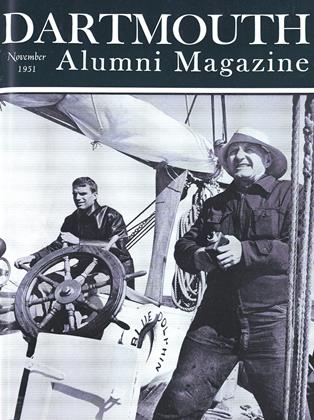As one of the world's leading experts for one of the most complicated and responsible operations of the State Departmentthe preparation and interpretation of treaties—John W. Foley Jr. '37 took an essential part in the smooth functioning of the San Francisco conference at which the treaty with Japan was signed. Holding the official title of "Treaty Adviser" in the office of the Legal Adviser of the State Department, Foley is*.senior adviser in the section responsible for treaty affairs.
On the big day of a treaty signing, after the diplomats and policy makers have done their work, the Treaty Branch takes over. Foley and his colleagues alone know the complicated techniques of preparing the final version on the special paper used for such occasions, typed on the special typewriter which in September was flown out to San Francisco with its specially trained operator. The actual stage-managing of the signing calls for a rare degree of administrative skill, poise and diplomacy. At the San Francisco conference, the multilateral treaty had to be signed without any possibility of mistake by many countries. As it was not certain until the last minute just who would be signing, it was Foley's task (on which he worked the whole night preceding the conference) to check the form of the signature clauses at the various delegation headquarters. Each clause then had to be entered on the English, French, Spanish and Japanese versions.
John Foley performed this same stagemanaging function at the signing of the North Atlantic Treaty in 1949. The preparation and signing of the elaborate treaties of today call for a wealth of experience and knowledge. Even a bi-lateral agreement is complicated: there are usually four copies, one in English for each country, one in the other language for each country, one with the United States named first and one with the other country named first.
Since the Treaty Branch in the State Department is also the repository of treaties and agreements and the source of information about them, the Treaty Adviser is usually consulted by a negotiator early in the game. Foley's interest in a given treaty is not only concerned with its signing, although this may be the most spectacular phase of his work, but usually with its development as well.
While at Dartmouth John Foley was a Rufus Choate Scholar and a member of Phi Beta Kappa. Upon graduation he studied under a fellowship in the School of Economics and Political Science at the University of London and later held the H. G. Robinson Fellowship in international relations at Yale. As first lieutenant in the Marine Corps during the last war he received special commendation for "skillful and effective performance of duty as Intelligence Officer of a Marine Regiment in action.. .."
JOHN W. FOLEY JR. '37, treaty expert of the U. S. State Department (right), looks on as Japan's Prime Minister Yoshida signs the peace treaty with the Allies in San Francisco, September 8.
 View Full Issue
View Full Issue
More From This Issue
-
 Class Notes
Class Notes1918
November 1951 By ERNEST H. EARLEY, DONALD L. BARR -
 Article
ArticleTHE COLLEGE
November 1951 By John Hurd '21 -
 Article
ArticleA Free Man Is Answerable
November 1951 By President Dickey -
 Article
ArticleTo the Top of McKinley
November 1951 By JERRY MORE 52. -
 Article
ArticleMore Bone and Sinew For a Growing College
November 1951 By NICHOL M. SANDOE '19 -
 Article
ArticleAmbrose White Vernon
November 1951 By DONALD BARTLETT '24







